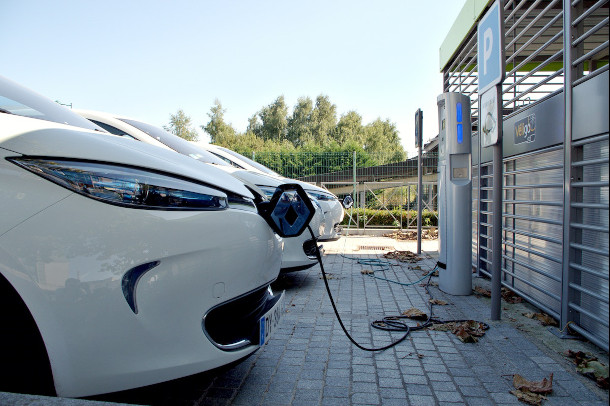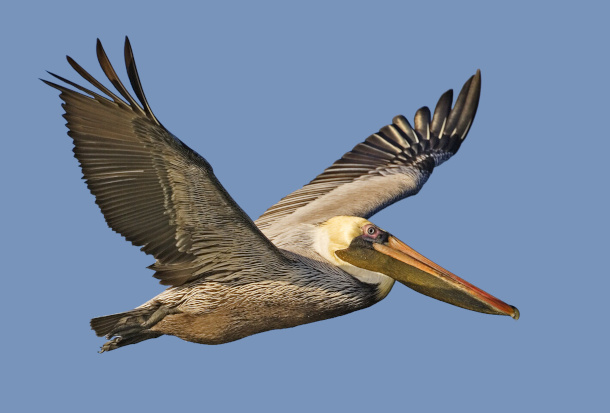Beyond the Headlines
Air Date: Week of February 3, 2023

People in Montana are constructing artificial beaver dams to re-create their ecological benefits and, hopefully, attract the animal back to the area. (Photo: Keith Williams, Flickr, CC BY-NC-ND 2.0)
This week, journalist Peter Dykstra reaches Beyond the Headlines to bring us good news. People in Montana are constructing artificial beaver dams to restore marshes. Companies are flooding into Georgia to build electric vehicles, providing 28,000 jobs. And, since the banning of DDT in the 1970s, Brown Pelicans have made a strong comeback.
Transcript
BASCOMB: It's Living on Earth, I'm Bobby Bascomb.
CURWOOD: And I'm Steve Curwood
On the line from Atlanta, Georgia with me now is Living on Earth commentator Peter Dykstra. Hi there, Peter, what do you have for us today?
DYKSTRA: Hi Steve, there is a story about some unusual beaver dams that had been built over the past few years out in the southwestern corner of Montana, not far from Yellowstone. And what's unusual is that these beaver dams were not built by beavers. They were built by human beings.
CURWOOD: Eager people I suspect.
DYKSTRA: Most eager. And the reason they're doing this is that the ecological benefits of beaver dams have been lost. Going back to the 1800s. Trappers have reduced the number of beavers there. And because the snowmelt is rarer with climate change, with warmer temperatures, with a recent drought, and without beaver dams, it's actually changed the environment, and made areas less marshy because water runs through more quickly. And there have been several beaver dams constructed by humans to replicate the environmental benefits of dams built by actual beavers. And there's actually a hope that the existence of beaver dams built by people will help draw back actual beavers.
CURWOOD: Let's see what happens. Maybe we'll hear some tails slap it on the water near these artificial beaver dams. Hey, Peter, what else do you have for us today?

Georgia is on the path to become a leader in American electric vehicle production. (Photo: RawPixel, public domain)
DYKSTRA: Something from right here in Georgia where I live. I've lived here for 30 years. And this is the kind of thing I never would have expected would come out of Georgia. But Georgia is poised to be to electric vehicles what Detroit and Michigan have historically been to fossil fuel vehicles, with billions upon billions of investments and an estimated 28,000 new jobs. That is a conservative estimate from conservative Governor Brian Kemp.
CURWOOD: So what are the projects that have been funded, with probably a little bit of help from Joe Biden's inflation Reduction Act?
DYKSTRA: They're definitely getting help from the federal legislation. And of course, there are two relatively new Democratic senators who helped push that through on the national level. But there are battery plants, ebike plants, a truck manufacturer. It's an astounding turnaround from a government that I would have least expected.
CURWOOD: And thank you for the cheer for Georgia, Peter. What do we have for history?

Brown Pelicans were removed from the endangered species list in 1985 thanks to the banning of DDT. (Photo: Alan D. Wilson, Papa Lima Whiskey, Wikimedia Commons, CC BY-SA 3.0)
DYKSTRA: Well, one of the first Endangered Species Act success stories took place back on February 4th 1985 when the brown pelican was removed from the endangered species list. It had been put on the list in 1970, when the Endangered Species Act was passed by Congress. Pelicans had been absolutely smashed by the pesticide DDT, like so many other bird species. DDT thinned the egg shells of little baby pelicans. DDT was banned in '72. And now you can't go to the sea coast, anywhere from the Gulf of Mexico and Texas, up to the Carolinas and not see a lot of brown pelicans, a success story to be proud of. And when they tell you that the government can't make these things happen. There's one case where the government did.
CURWOOD: Indeed. Hey, thanks, Peter. Peter Dykstra is a commentator for Living on Earth. We'll talk to you again real soon.
DYKSTRA: Okay, Steve, thanks a lot. Talk to you soon.
CURWOOD: And there's more on these stories on the Living on Earth webpage. That's loe.org.
Links
Yale Climate Connections | "People Are Building Artificial Beaver Dams in Drought-Stricken Montana"
ABC News | "Biden Climate Law Spurred Billions in Clean Energy Investment. Has It Been a Success?"
The Atlanta Journal-Constitution | "In Clean Energy Transition, Georgia is at the Tip of the Spear"
Living on Earth wants to hear from you!
Living on Earth
62 Calef Highway, Suite 212
Lee, NH 03861
Telephone: 617-287-4121
E-mail: comments@loe.org
Newsletter [Click here]
Donate to Living on Earth!
Living on Earth is an independent media program and relies entirely on contributions from listeners and institutions supporting public service. Please donate now to preserve an independent environmental voice.
NewsletterLiving on Earth offers a weekly delivery of the show's rundown to your mailbox. Sign up for our newsletter today!
 Sailors For The Sea: Be the change you want to sea.
Sailors For The Sea: Be the change you want to sea.
 The Grantham Foundation for the Protection of the Environment: Committed to protecting and improving the health of the global environment.
The Grantham Foundation for the Protection of the Environment: Committed to protecting and improving the health of the global environment.
 Contribute to Living on Earth and receive, as our gift to you, an archival print of one of Mark Seth Lender's extraordinary wildlife photographs. Follow the link to see Mark's current collection of photographs.
Contribute to Living on Earth and receive, as our gift to you, an archival print of one of Mark Seth Lender's extraordinary wildlife photographs. Follow the link to see Mark's current collection of photographs.
 Buy a signed copy of Mark Seth Lender's book Smeagull the Seagull & support Living on Earth
Buy a signed copy of Mark Seth Lender's book Smeagull the Seagull & support Living on Earth

